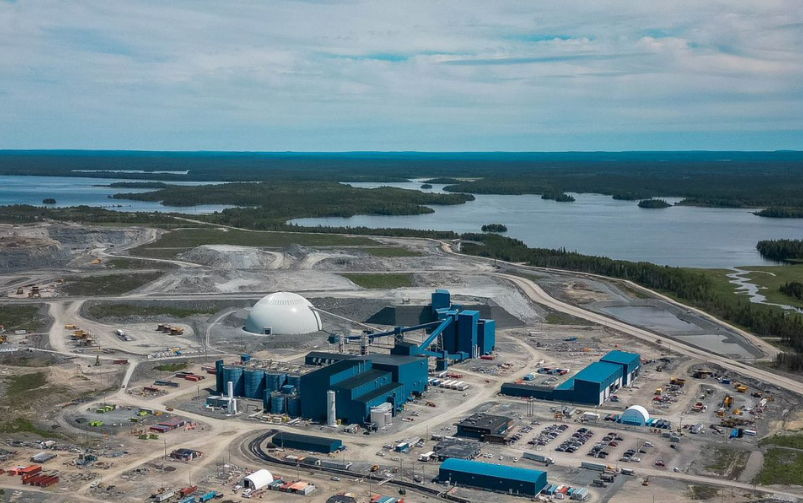Agnico Eagle’s minority stake in Canada Nickel, which owns the Crawford project (pictured), shows that the miner is interested in diversifying beyond gold. Courtesy of Canada Nickel.
Welcome back to your weekly mining news recap, where we catch you up on some of the news you may have missed. This week’s headlines include Allkem’s James Bay lithium project receiving environmental approval, a Yukon board recommending against TMM Goldcorp’s mining road proposal and research revealing that most global mining areas are undocumented.
Agnico Eagle has secured a 12-per cent stake in Canada Nickel and its nickel-sulfide deposits in Ontario’s Timmins region for nearly $34.7 million, as reported by Northern Ontario Business. The transaction marked the company’s “early-stage investment” into the critical minerals sector beyond its gold assets. In November, Canada Nickel released a feasibility study for its flagship Crawford nickel-cobalt sulfide project that outlined a low-grade, high tonnage open pit operation that would produce an average of 48 kilotonnes per year of nickel over a 41-year life.
Barrick Gold Corp. is interested in acquiring First Quantum’s copper business, as reported by BNN Bloomberg. A deal, which according to Bloomberg has been floated to First Quantum’s major investors, could propel Barrick to become one of the world’s biggest copper producers. First Quantum’s Cobre Panama copper mine in Panama has been idled since late last year amid strong opposition, leaving the company without its biggest earner.
Indigenous opposition in Canada to online claim staking continues to grow. First Nations leaders in Ontario want a year-long moratorium on the staking process, as reported by Northern Ontario Business. The Mining Lands Administration System (MLAS), introduced in 2018, allows anyone to register and stake an Ontario mineral claim online. The Chiefs of Ontario urged a pause on the practice, stating that the current system bypasses Indigenous consent, consultations and accommodations. This follows a decision last fall from the B.C. Supreme Court, which ruled in favour of two First Nations who argued that the province’s online claim staking process did not satisfy the government’s duty to consult.
The Yukon Environmental and Socio-economic Assessment Board (YESAB) has recommended against TMM Goldcorp Inc.’s plan for a mining road near its proposed Casino copper-gold project, as reported by CBC News. The company proposed upgrades to 11.1 kilometres of existing roads and the construction of an additional 2.7 kilometres of a year-round mining road. The board cited the concern of First Nations groups in regard to the project’s impacts on moose and caribou herds in the area among the reasons for its recommendation. The proposed road is pending approval from the Yukon Government and the federal Department of Fisheries and Oceans.
Allkem Limited has received a Certificate of Authorization from Quebec’s Environmental and Social Impact Review Committee (COMEX) for its James Bay lithium project, which is the final piece of approval needed to proceed with the project development. Allkem stated detailed engineering and procurement for the project are almost done, and construction permits will be submitted soon. The project is expected to produce 311 kilotonnes of spodumene concentrate per year over its roughly 19-year mine life.
Condor Resources has announced an option and joint venture deal with Teck Resources on Condor’s Cobreorco copper-gold project in Peru, as reported by the Canadian Mining Journal. Teck Perú, a subsidiary of Teck Resources, entered into a deal, where Teck can gain up to a 75-per cent interest in the project based on cash payments and exploration spending of US$11.1 million through two three-year phases.
A majority of global mine sites and exploration zones are undocumented, according to new research in Nature. About 67,000 square kilometres, or 56 per cent, out of 120,000 square kilometres of mining land has missing documentation about production, according to data collected through satellite imaging.
Companies are finding innovative solutions to slope stability problems in open-pit mining, wrote Catherine Hercus in the November issue of CIM Magazine. WPS, Hexagon and GroundProbe are some of the companies using radar technologies and monitoring systems to detect and prevent slope failures to maximize safety and operational efficiency.
That’s all for this week. If you’ve got feedback, you can always reach us at editor@cim.org. Have something interesting to add? Join the conversation on our Facebook, Twitter, LinkedIn or Instagram.




